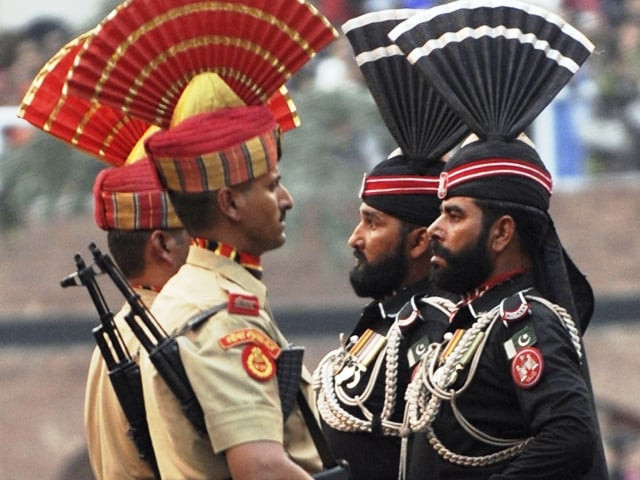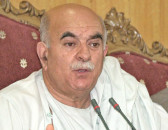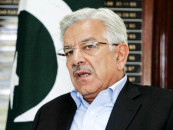In a first, pandemic takes a toll on Pakistan-India routine exchanges
Pandemic also casts its dark shadow over joint parades at Pakistan-India border openings

For the first time in decades, the joint parade between Pakistan and India at the border openings has met with a prolonged hiatus due to the pandemic, silencing the echo of slogans that attracted masses from both sides of the border.
Pakistan and India have their fair share of tensions, with frequent flare ups, but even that has never disrupted the joint parade from happening. Unfortunately, this year the joint parade was called off when Pakistan and India closed their borders in March to stem the spread of COVID-19.
At Wagah border in Lahore, Ganda Singh Border in Kasur and Head Sulemanki, Pakistan Rangers Punjab and India’s Border Security Force personnel used to unfold and salute their respective country's flag in a simple and elegant ceremony.
The pandemic has casted his dark shadow on the ceremony in which the young men in uniform opened and closed the border gates and shook hands with each other.
Rana Mubashir Hassan, a resident of an area in the vicinity of the Wagah border, said that the atmosphere has been gloomy for the last nine months due to the ongoing pandemic.
“Every afternoon was bright and vivacious, with loud slogans of Allah hu Akbar and long live Pakistan vibrating through the air. Daily, a round of applause was heard, but now there exist deep shadows of silence,” recalled Hassan.
Admired equally by Pakistanis and Indians, the ceremony’s charm had its impact on foreign tourists as well, who made special plans to attend the ceremony.
According to Pakistan Rangers officials, a joint parade between the Pakistani and Indian border forces on the Wagah border began in 1959 and continued without any interruption.
Taking a glance back, the parade was held for one day after the suicide attack on the Wagah border on November 2, 2014, but India cancelled the parade on its side.
On September 29, 2016, India also halted the parade on its side due to strained relations.
On the bright side, the two countries have opened the border exclusively for Sikhs and Hindus pilgrims coming to Pakistan from India, for the return of their citizens, exchange of prisoners, and commute for diplomats.
Meanwhile, Pakistan’s diplomatic ace card, the Kartarpur Corridor, also witnessed a record low attendance of Indian visitors.
In the wake of the coronavirus-induced lockdown, the forces deployed on the borders lower down flags of their respective countries every evening without holding any joint parade.
In response to India’s decision to revoke Article 370, Pakistan did not only suspend its trade relations with India, but also suspended the Samjhota train service and Thar Express. Lahore to Delhi and Lahore-Amritsar friendship bus services were also shut down.
On the diplomatic front, tensions between both the countries considerably soared in 2020.
Alleging espionage in May 2020, India had deported two Pakistani diplomats. Following which, both the countries decided to reduce their diplomatic staff by 50%.
As per the mutual agreement, both the countries can depute 110 diplomatic staff and personnel in the other country.
The members of the diplomatic staff returned to India on June 22. Likewise, the members of Pakistani diplomatic staff also returned from New Delhi. India had also called its ambassador back, who has not returned to Pakistan till date.
Responding in kind, Pakistan also did not send its designated ambassador for New Delhi to India.
Despite reluctance from India, Pakistan had issued visas both for the Indian Sikhs and Hindus for a limited time, allowing them to perform religious rituals across the border.
The Sikh pilgrims arrived in Pakistan in November to celebrate the birthday of Baba Guru Nanak Devji, while in December 2020, a delegation of Indian pilgrims arrived in Pakistan. India, on the other hand, did not issue any visas to Pakistanis.
Pakistan invited the Indian Sikh pilgrims on the event of Mahraja Ranjeet Singh's death anniversary on June 29 and also on the 551st birthday of Guru Nanank Devji in November. Despite the olive branch from Pakistan, India did not reopen its side of the corridor.
The Wagah border remains closed since March 15, but the Wagah-Attari border was opened on several occasions for the return of the citizens.
Going down the memory lane, an elderly resident of Lahore Baba Fazal Din said apart from the war times, the border parades have not been suspended.
Calling these unprecedented times, Din said that the border was not closed during the 1965 and 1971 wars between Pakistan and India. “The only reason, the parade could not be held was that Pakistan and India were at war at the time.”



















COMMENTS
Comments are moderated and generally will be posted if they are on-topic and not abusive.
For more information, please see our Comments FAQ